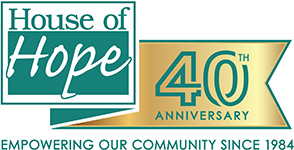Not a Game: Daring to be Poor in Martin County
This is not a game. That introduction to the House of Hope’s Dare to Care Poverty Simulation turned out to be brutally true.
A cross-section of Martin County residents, me included, had a chance to feel what it is like to live on the edge of poverty for just one morning in March, and we realized immediately that what we experienced wasn’t anything like a game. For many people in our community it’s real life – and a struggle for survival.
Just a few minutes into the simulation, I overheard a woman say, “This isn’t even my life, and I want to cry.” I felt the same.
We were each assigned an identity. I became Ed, a 17 year old who dropped out of high school and lived with his mom and sister. At first I thought this could be fun – I’m far from 17, and I’ve never been a boy. It wasn’t fun.
My “mom” was at her wit’s end because she had only $10 to her name, my “sister” needed $5 for a school trip, and I was mostly useless. We had no transportation to get anywhere and couldn’t get services if we couldn’t figure out how to get transportation to the offices where we could get help. By the end of week 1 in the simulation, we had no food in the house, I was being hassled by the police because I wasn’t in school, and my sister suggested that since I was such a deadbeat anyway, I should just go steal something to help out.
Honestly, as Pat, I would never consider that. As Ed, it started to seem like a good idea.
By week 2, we started to figure out the system. Mom got to the employment office to apply for a job, but it wouldn’t start for a week. We got some food. Then she got sick. She never got to start the job.
I could feel the frustration in the room. These usually confident people were feeling powerless in their new identities. It felt like a catch-22 horror movie. You can’t keep a job because you don’t have transportation. You can’t afford transportation until you have a job and get paid. You can’t leave your kids to get a job because the child care center just closed and you have to stay home with the kids. You thought you had a job, but now they’re not hiring.
My family got evicted. My mom and sister went to a shelter, but I couldn’t go because males over 13 aren’t allowed in any of the existing shelters in Martin County. My girlfriend’s dad reluctantly let me move in with them but told me I had to get a job or get kicked out. I applied for a job but I have no skills or experience, and the application just got pushed to the side.
One woman was distraught. Her “baby” was taken from her because she couldn’t care for the child. She had no income, no way to leave the house to get an income, and she couldn’t decide whether the pain of losing her child or the pain of not being able to care for her child caused greater pain. This was a simulation, remember, but we all felt the injustice of it all.
Bad things happened unexpectedly. Even family units that seemed as though they were pulling it together were falling apart because of illness, housing problems that they couldn’t afford to fix, utilities being cut off. And then the worst of all - someone in our little community was trying to scam us! Mistrust was growing,
Also anger. Who were these people at the service desks around the room who were determining our fate, closing the door just when we finally got transportation to the office or telling us that we didn’t qualify because we didn’t have certain pieces of required paperwork? Common refrains were: “You can’t do that!” and “How can they do that?!” Going to jail seemed like a stroke of luck – a place to live and 3 meals a day. Better than the alternative.
Many families were evicted before the session was over. Some moved in with other families to try to make a go of it. People started relying on each other.
But please don’t think for a moment that there is a happy ending here. Families were pulled apart. Everyone who wasn’t paralyzed from being overwhelmed was frustrated. And families couldn’t share what they didn’t have.
We learned some hard lessons: you need money to make money. You spend most of your time running around looking for resources. If you don’t have transportation, everything is doubly difficult – or impossible. There are gaps in the available resources, and if you fall in one of those gaps, you may never get out again.
Our experiences were way too real. Every day we had to try to survive. We had to keep coming up with new plans. It was impossible not to take things personally while feeling like you couldn’t win even if you tried.
It was debilitating and exhausting – and it only lasted a morning. For people living at poverty’s edge, this scenario is life – and anyone who survives is heroic.

A cross-section of Martin County residents took part in House of Hope’s Dare to Care Poverty Simulation on March 6
What did we learn from this experience? As the group discussed it after the simulation, we knew in every cell of our being that poverty is hard. We were humbled as we realized what it takes to survive when you’re financially on the edge. And we were immensely grateful to be able to return to our own lives.
We also realized that gaps exist even in our caring community of Martin County and they make life even harder – lack of affordable housing, lack of transportation, lack of sufficient mental health resources, limited child care.
Rob Ranieri, House of Hope CEO, consoled as we finished the exercise, reminding us that in our community there are lots of agencies doing good work to help people in need. But, he said, there’s always more to do.
Oh yes, there is – because being poor is not a game.
I recommend this program to anyone and everyone, no matter how well you think you understand the community. Dare to Care gives you a perspective that you won’t find anywhere else – and one you won’t easily forget.








